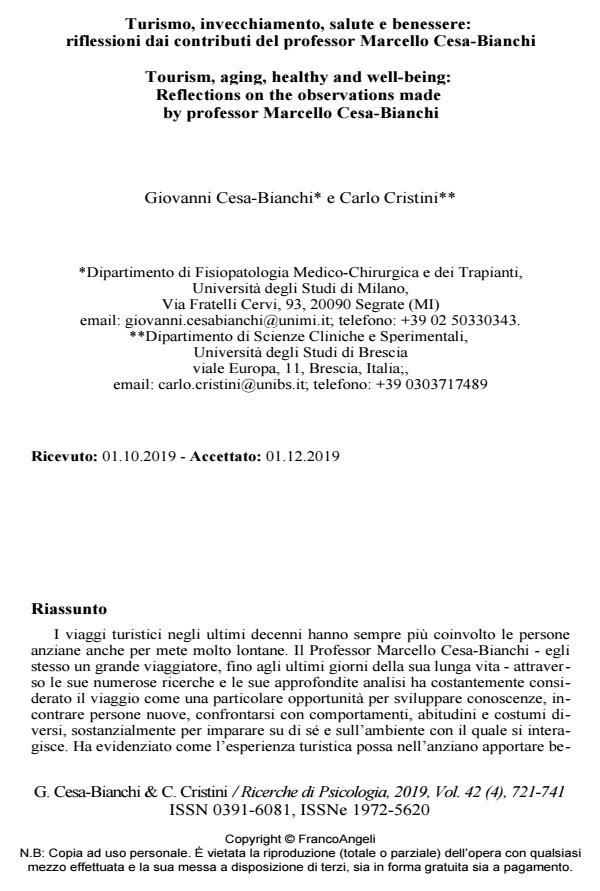Tourism, aging, healthy and well-being: Reflections on the observations made by professor Marcello Cesa-Bianchi
Journal title RICERCHE DI PSICOLOGIA
Author/s Giovanni Cesa-Bianchi, Carlo Cristini
Publishing Year 2020 Issue 2019/4
Language Italian Pages 21 P. 721-741 File size 218 KB
DOI 10.3280/RIP2019-004009
DOI is like a bar code for intellectual property: to have more infomation
click here
Below, you can see the article first page
If you want to buy this article in PDF format, you can do it, following the instructions to buy download credits

FrancoAngeli is member of Publishers International Linking Association, Inc (PILA), a not-for-profit association which run the CrossRef service enabling links to and from online scholarly content.
Over recent decades, leisure travel has increasingly involved older people, even for very faraway destinations. Professor Marcello Cesa-Bianchi - he himself a great traveller, right up to the last days of his long life - carried out a lot of research and in-depth analysis, leading him to consider travel to be a unique opportunity to develop knowledge, meet new people and experience different ways of behaving, habits and customs, substantially learning about ourselves and the surroundings with which we interact. He highlighted how tourism can create psychophysical well-being in the elderly, help them to rediscover emotions and memories, facilitate communications, with a particular focus on intergenerational communication, develop creativity and personal growth, educate them with regard to respecting the local area and the environment and promote the overcoming of prejudice and a better culture of integration. He underlined how tourism can also represent a metaphor for an inner journey that allows us to express and enhance our feeling of self worth, representing a positive experience able to activate new and significant paths towards good health and well-being.
Keywords: Tourism, ageing, healthy, well-being.
- SAĞLIK TURİZMİ ALANINDA YAPILAN ÇALIŞMALARININ VOSVİEWER İLE BİBLİYOMETRİK ANALİZİ Mustafa KAZAK, Gülşah KAZAK, in Journal of Healthcare Management and Leadership /2023 pp.34
DOI: 10.35345/johmal.1253318
Giovanni Cesa-Bianchi, Carlo Cristini, Turismo, invecchiamento, salute e benessere: riflessioni dai contributi del professor Marcello Cesa-Bianchi in "RICERCHE DI PSICOLOGIA " 4/2019, pp 721-741, DOI: 10.3280/RIP2019-004009